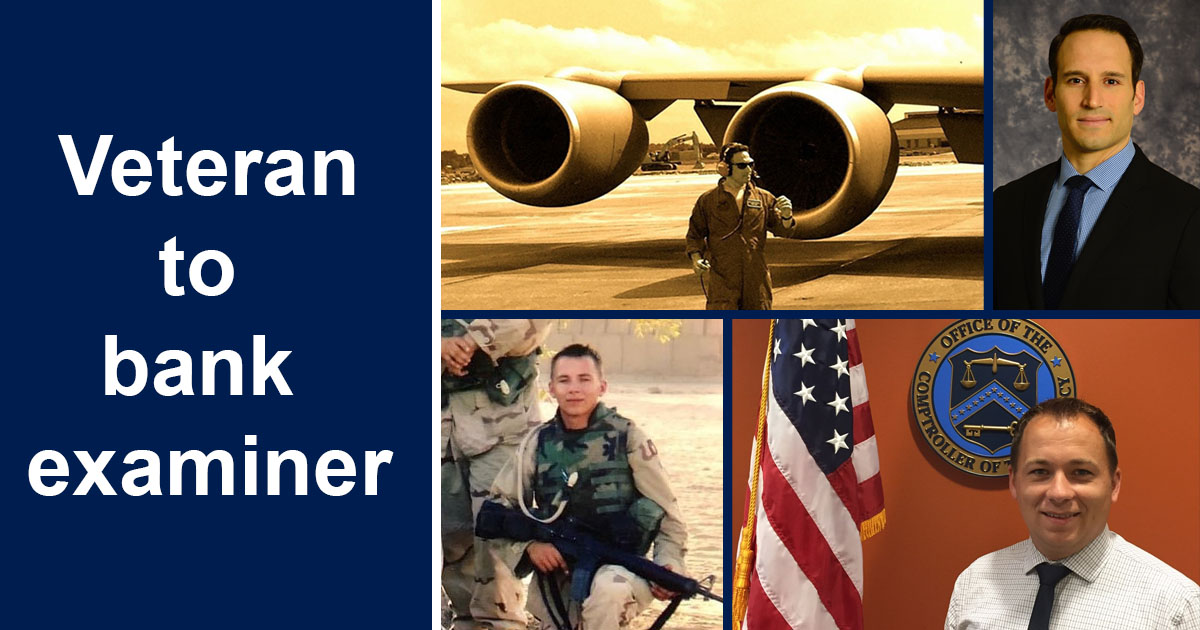Veterans wanting a challenging career that ensures the safety and soundness of the federal banking system can find it as a national bank examiner.
The Office of the Comptroller of the Currency (OCC) charters, regulates and supervises all national banks and federal savings associations (collectively, banks) as well as federal branches and agencies of foreign banks. The OCC is an independent bureau of the U.S. Department of the Treasury.
National bank examiners play a critical role ensuring that national banks and federal savings associations operate in a safe and sound manner, provide fair access to financial services, treat customers fairly, and comply with applicable laws and regulations. Examiners interact with all levels of bank management and complete a wide range of analytical and bank supervisory activities at national banks and federal savings associations and OCC offices. They use a risk-based examination approach to assess a bank’s condition and identify potential problems.
From crew chief to national bank examiner
Air Force Veteran Justin Solobay is one of those national bank examiners. A KC-135 flying crew chief, Solobay spent 12 years in the Air National Guard and is 10 years into an Air Force Reserve career. He has been activated and deployed multiple times since 2002.
In 2013, Solobay joined the OCC in the Office of Security managing the agency’s business continuity and disaster recovery programs. He started taking examiner assignments in 2017 and crossed over in 2019, joining the Wells Fargo Large Bank Supervision team as an operational risk examiner. Although his civilian job is vastly different from his military job, he said using military attributes like focus, determination, teamwork and resilience helped.
“I joined the agency having no idea what the agency did,” Solobay said. “I focused on the business continuity program and learned more about it. The military is a different commitment in my life that I run in parallel.”
He said the best part of his job is the people, who he said are exceptionally talented, experienced, intelligent, and logical.
“This agency is a great place to work,” he said. “There are many opportunities to see and do new things. Additionally, there are many pathways you can grow into and move about as it supports your interest and wants.”
Sheer luck brings Iraq Veteran aboard
Army Veteran Jason Wander is another Veteran who joined the OCC after spending time in the military. An Army National Guard combat engineer, Wander deployed twice to Iraq, building forward operating bases and a detainee facility, servicing and maintaining vehicles, performing route clearance to remove improvised explosive devices, and providing base security.
In 2012, Wander joined the OCC as an assistant national bank examiner in the Minneapolis field office. He worked on his national bank examiner commission while supervising community banks in the Midwest. He said it was sheer luck he joined.
“After college, I worked many jobs that didn’t provide me the career aspirations I hoped for,” Wander said. “Then, I remembered that my VA benefits would provide me with career counseling services through the Veterans Readiness and Employment office. Months after consulting with a case manager to edit my resumé, prepare for interviews, and find a career I would enjoy, the case manager called and said they stumbled upon a position at the OCC as a bank examiner. My first questions were, ‘what is the OCC, and what is a bank examiner?’”
While his Army job was to build and destroy, he said his leadership skills and military core values carried forward to his civilian career.
“Bank examining requires an individual to be decisive under pressure,” Wander said. “Being in a position of public office, our agency requires a staff with unmatchable integrity. Without integrity, public trust could be deterred. Punctuality and strong verbal communication skills are also applied day in day out.”
Wander said transitioning from the military to a public service career was a great option, one he encourages other Veterans to follow.
“I take pride in making a difference,” he said. “Without sound banking practices, many avoidable events may occur: banks may fail, consumers may unnecessarily lose their home, or consumer information could be stolen. Going to work each day, I know that I contribute to the safety of banking and protection of consumers.”
A career in bank examining
Entry-level bank examiners begin careers in Midsize and Community Bank Supervision as an assistant national bank examiner, with offices across the U.S. This experience provides the foundation for learning the practical aspects of bank supervision.
Assignments cover all areas of banking, including loans, interest rate risk, capital, liquidity, consumer protection programs, and compliance with banking laws and regulations. Through a program of continuing education and career development, OCC examiners expand their knowledge and skills. They apply their technical expertise and interpersonal skills in an industry with increasingly sophisticated products and services.
Entry-level bank examiners, or assistant national bank examiners, spend approximately 15% to 95% of their early careers traveling. They may work in one of the OCC’s field offices located across the U.S., at banks, or at bank branches. See estimated overnight travel percentages by field office location.
Qualifications
To become an assistant national bank examiner, applicants must meet at least one of the following:
- A four-year course of study leading to a bachelor’s degree with major study in accounting, banking, business administration, commercial or banking law, economics, finance, marketing, or another field closely related to the position; OR
- Three years of work experience
- demonstrating knowledge of accounting or auditing principles, such as reviewing, analyzing, recommending or approving loan applications, investments, or other actions involving the properties or monies of others held in trust by or for a financial institution, and/or
- performing internal accounting or auditing work for a financial institution that has required understanding of debits and credits, balance sheets, and operating statements; OR
- Equivalent combinations of education and experience; OR
- A Certified Public Accountant (CPA) certificate obtained through written examination in a state, territory, or the District of Columbia.
In addition to meeting minimum qualifications, you must successfully pass the examiner entry-level pre-employment tests.
Questions regarding the application and hiring process for ANBEs can be directed to ANBERecruitment@occ.treas.gov.
Learn more
Learn more about the OCC at the following links.
OCC Careers Home | View current openings | Salary structure | Benefits | Diversity
The Federal Deposit Insurance Corporation, Federal Reserve System, and National Credit Union Administration also hire bank examiners, as well as other careers. Learn more at the links below.
Positions at FDIC | Positions at the Federal Reserve | Positions at NCUA
Many states also hire bank examiners. Learn more at your state’s employment website.
Topics in this story
More Stories
Nearly 400 Veterans from across the country have gathered in Snowmass Village for the 39th Annual National Disabled Veterans Winter Sports Clinic. This premier adaptive rehabilitation event, co-presented by VA and Disabled American Veterans (DAV), continues through April 5.
VetServe is a celebration of service and a call-to-action to encourage Veterans, their families, caregivers and survivors to serve in their community.
Scholarship America administers scholarships for students attending vocational school, two-year colleges, and four-year colleges and universities.





